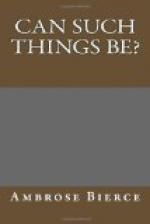Filled with these reflections, I was for some time heedless of the sequence of my own experiences, but soon I thought, “How came I hither?” A moment’s reflection seemed to make this all clear and explain at the same time, though in a disquieting way, the singular character with which my fancy had invested all that I saw or heard. I was ill. I remembered now that I had been prostrated by a sudden fever, and that my family had told me that in my periods of delirium I had constantly cried out for liberty and air, and had been held in bed to prevent my escape out-of-doors. Now I had eluded the vigilance of my attendants and had wandered hither to—to where? I could not conjecture. Clearly I was at a considerable distance from the city where I dwelt—the ancient and famous city of Carcosa.
No signs of human life were anywhere visible nor audible; no rising smoke, no watch-dog’s bark, no lowing of cattle, no shouts of children at play—nothing but that dismal burial-place, with its air of mystery and dread, due to my own disordered brain. Was I not becoming again delirious, there beyond human aid? Was it not indeed all an illusion of my madness? I called aloud the names of my wives and sons, reached out my hands in search of theirs, even as I walked among the crumbling stones and in the withered grass.
A noise behind me caused me to turn about. A wild animal—a lynx— was approaching. The thought came to me: If I break down here in the desert—if the fever return and I fail, this beast will be at my throat. I sprang toward it, shouting. It trotted tranquilly by within a hand’s breadth of me and disappeared behind a rock.
A moment later a man’s head appeared to rise out of the ground a short distance away. He was ascending the farther slope of a low hill whose crest was hardly to be distinguished from the general level. His whole figure soon came into view against the background of gray cloud. He was half naked, half clad in skins. His hair was unkempt, his beard long and ragged. In one hand he carried a bow and arrow; the other held a blazing torch with a long trail of black smoke. He walked slowly and with caution, as if he feared falling into some open grave concealed by the tall grass. This strange apparition surprised but did not alarm, and taking such a course as to intercept him I met him almost face to face, accosting him with the familiar salutation, “God keep you.”
He gave no heed, nor did he arrest his pace.
“Good stranger,” I continued, “I am ill and lost. Direct me, I beseech you, to Carcosa.”
The man broke into a barbarous chant in an unknown tongue, passing on and away.
An owl on the branch of a decayed tree hooted dismally and was answered by another in the distance. Looking upward, I saw through a sudden rift in the clouds Aldebaran and the Hyades! In all this there was a hint of night—the lynx, the man with the torch, the owl. Yet I saw—I saw even the stars in absence of the darkness. I saw, but was apparently not seen nor heard. Under what awful spell did I exist?




